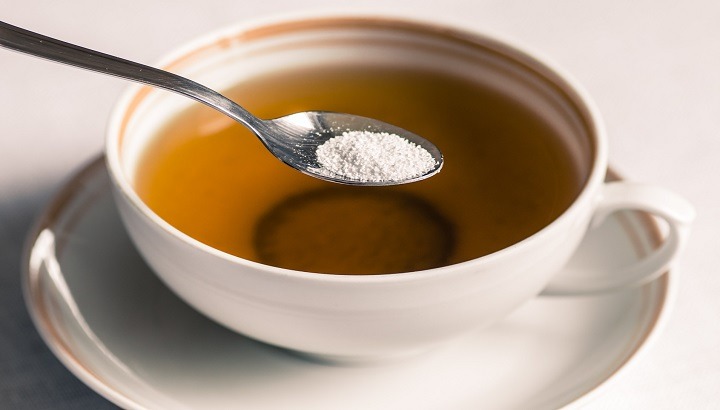Pink. Blue. Yellow. It’s a tightly packed pastel rainbow in a little rectangular dish on the table at restaurants and cafes across the world. Artificial sweeteners. $1.5 billion in global sales every year. It’s pretty clear that consuming large quantities of sugar is a bad idea… Are these sugar substitutes a healthier choice???
In the quest to avoid sugar and carbs, increasing numbers of people are turning to artificial sweeteners as a substitute. he oldest, and still the most popular, is the pink one… saccharin. Next in line is the blue one… aspartame. Newer on the scene is the yellow one… sucralose. All of them are marketed as healthy alternatives to sugar… but in reality, they’re anything but.
I agree completely that avoiding sugar is a worthy mission… but these artificial sweeteners are never the way to go.
Weight loss (or avoiding weight gain) is the most common reason that people choose to use artificial sweeteners. On the surface, this seems like a reasonable idea… excessive sugar consumption is indeed a leading contributor to obesity. That’s why so many people who are trying to shed a few pounds think that swapping artificial sweeteners for sugar will help them along. In an ironic twist, consuming artificial sweeteners on a regular basis appears to have the opposite effect. That’s right, sugar substitutes appear to cause weight gain… not reverse it. And we are just starting to understand why.
It has been clear for many years that people who drink diet sodas and sugar-free snacks tend to be heavier than those who don’t. Until recently, it was not clear whether this was a cause or effect relationship. In other words, we’re not sure if artificial sweeteners cause weight gain, or if people who are already obese are more likely to consume artificial sweeteners. However, research on the science of sweet is starting to help clear up the confusion.
Here’s how I explain this to my patients: When you put something sweet on your tongue, your body begins to prepare for the arrival of glucose in your bloodstream. It’s like your internal biochemistry gets primed and ready for your blood sugar to rise. When you eat an artificial sweetener, your tongue sends the “sugar is coming” message to your system… but the blood sugar never rises. This leaves your body craving sugar, and many people will then just seek and find that sugar somewhere else. Research has shown that the consumption of artificially sweetened beverages or snacks actually increases the consumption of other carbohydrate sources afterwards.
Previous research has linked artificial sweeteners with the aforementioned “sugar seeking behavior.” Up to this point, it was unknown exactly why this occurred. However, new research sheds some light on one reason why this might be the case.
A new study published in the journal Applied Physiology, Nutrition, and Metabolism examined aspartame’s effect on intestinal alkaline phosphatase, a gut enzyme which has been linked to preventing metabolic syndrome in mouse studies. This effect of aspartame, one of the most common artificial sweeteners on the market, may be responsible for the resistance to weight loss in people who consume large quantities of it. The mechanism appears to involve a common enzyme called alkaline phosphatase.
Dr. Richard Hodin, the senior author of the study explains:
“Sugar substitutes like aspartame are designed to promote weight loss and decrease the incidence of metabolic syndrome, but a number of clinical and epidemiologic studies have suggested that these products don’t work very well and may actually make things worse. We found that aspartame blocks a gut enzyme called intestinal alkaline phosphatase (IAP) that we previously showed can prevent obesity, diabetes and metabolic syndrome; so we think that aspartame might not work because, even as it is substituting for sugar, it blocks the beneficial aspects of IAP.”
This study on aspartame adds to a body of research that these artificial sweeteners, designed to encourage weight loss, actually prevent weight loss. This is a huge problem, because many people use these “diet” and “lite” products to lose weight, but end up encouraging weight gain. Not only is this counterproductive, it can lead to a lot of stress and frustration, along with increased risk of chronic disease.
Dr. Hodin adds:
“People do not really understand why these artificial sweeteners don’t work. There has been some evidence that they actually can make you more hungry and may be associated with increased calorie consumption. Our findings regarding aspartame’s inhibition of IAP may help explain why the use of aspartame is counterproductive. While we can’t rule out other contributing mechanisms, our experiments clearly show that aspartame blocks IAP activity, independent of other effects.”
It’s pretty clear that we should all steer clear of the pink, blue and yellow. So the next time you’re in the mood for something sweet… what do you do?
The first step is to decrease sugar and sweet consumption in general. When you reach for sugar, use half as much in your coffee or tea, and try cutting the sugar in recipes by 50%. Over several weeks, this practice will help to reduce your taste for highly sweetened food and drinks. If you’re ready for a bigger switch, get rid of the sugar entirely, and opt for honey. Honey is by far the sweetener of choice: it can safely be consumed in reasonable quantities and is actually associated with a wide variety of health benefits.
Forget the pink, blue, and yellow… and stick with the liquid gold.
– Dr. Joshua Levitt









